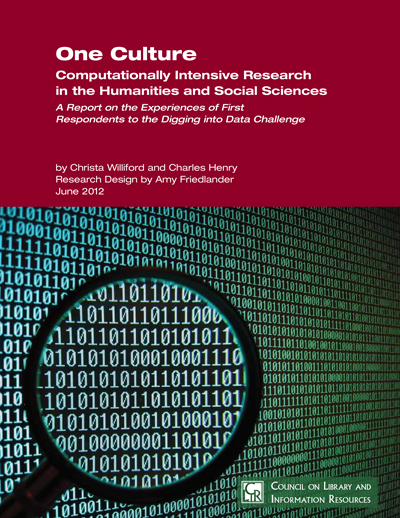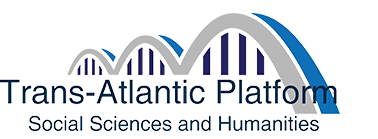Original Announcement of the Round Four (2016) Competition
January 20, 2016. The Trans-Atlantic Platform today announced that it will be launching its first international funding opportunity: the T-AP Digging into Data Challenge.
The T-AP Digging into Data Challenge will launch in March 2016. The Challenge will support research projects that explore and apply new “big data” sources and methodologies to address questions in the social sciences and humanities.
The funding opportunity is open to projects that address any research question in humanities and/or social sciences disciplines by using new, large-scale, digital data analysis techniques. All projects must show how these techniques can lead to new theoretical insights. Proposed projects can use any data source.
About T-AP
The Trans-Atlantic Platform (T-AP) is an unprecedented collaboration between key humanities and social science funders and facilitators from South America, North America and Europe.
T-AP aims to enhance the ability of funders, research organizations and researchers to engage in transnational dialogue and collaboration. Among other activities, it works to identify common challenges and emerging priorities in social science and humanities research. T-AP also facilitates the formation of networks within the social sciences and humanities and helps connect them with other disciplines. The Trans-Atlantic Platform for the social sciences and humanities has received funding from the European Union’s Seventh Framework Programme for research, technological development and demonstration under grant agreement no. 613167.
About the Digging into Data Challenge
The Digging into Data Challenge has been funding cutting-edge digital research in the humanities and social sciences since 2009. Now under the auspices of T-AP, the program will support collaborative research teams from three continents: Europe (Finland, France, Germany, the Netherlands, Portugal (to be confirmed) and the United Kingdom); North America (Canada, Mexico, the United States); and South America (Brazil and Argentina).
Original Press Releases
Press releases about the winners of Round Four:
AHRC CONACYT DFG ESRC FAPESP (Portuguese) FAPESP (English) IMLS NEH SSHRC/NSERC (English) SSHRC/NSERC (French) T-AP NWO (Dutch)
Press releases announcing kickoff of Round Four:
DFG FRQ MINCyT SSHRC (English) SSHRC (French) NEH ESRC IMLS NSF CONACYT FAPESP (Portuguese) FAPESP (English) AHRC
Round Four Conference
At the end of each round of funding, the grantees gather to present their work. The Round Four conference will be at the National Science Foundation in January 2020. See the conference web page.
Press:
- Pequisa, May 2017 (monthly), "A realidade que emerge da avalanche de dados" (Portuguese)
- University Affairs, May 2, 2017, "Big data research awards show the potential of international collaboration"
- University of Pennsylvania Almanac, April 25, 2017 "Mapping Manuscript Migrations: T-AP Digging into Data Challenge Award"
- McGill Reporter, April 19, 2017 "McGill project wins digging into Data Challenge"
- idw News Item. April 19, 2017. Volkskunde und Big Data.
- Cuniform Digital Library Initiative, April 3, 2017 "Machine assisted translation of cuneiform texts"
- University of California, Los Angeles, April 3, 2017 "UCLA Near Eastern Languages and Cultures Professor Robert K. Englund Receives Prestigious Grant for Research Collaboration on Big Data"
- Queen Mary University of London, March 31, 2017 "Musical influence in jazz investigated with ‘Big Data’"
- University of Wisconsin, Milwaukee, March 31, 2017 "Dr. Richard Smiraglia Awarded IMLS Grant: Digging Into The Knowledge Graph"
- SSHRC/NSERC (Canada) Press Release, March 31, 2017 "Granting councils award funding to teams from both sides of the Atlantic to advance digital research"
- FAPESP (Brazil) Press Release, March 31, 2017 "FAPESP and Trans-Atlantic Platform announce result of call for proposals"
- University of Waterloo, March 30, 2017 "Professor Jesse Hoey awarded funding from Trans-Atlantic Platform for the Social Sciences and Humanities"
- University of Oxford, March 30, 2017 "New £566,000 collaborative project under DIGGING INTO DATA programme"
- NEH (US) Press Release, March 30, 2017 "Sixteen International Research Funders Announce the Winners of the 2017 T-AP Digging into Data Challenge"
- Universität Rostock, March 29, 2017. ISEBEL gräbt in Big Data.
- Meertens Instituut. March 29, 2017. NWO-subsidie voor intelligente zoekmachine voor verhalenbanken.
- Aalto University, March 29, 2017 "Funding for research on child language experiences and medieval & renaissance manuscripts"
- IMLS (US) Press Release, March 29, 2017 "Sixteen Funders Announce Worldwide Winners of the 2017 T-AP Digging into Data Challenge"
- ESRC (UK) Press Release, March 29, 2017 "Trans-Atlantic Platform Digging into Data Challenge - 14 new research projects announced"
- CONACYT (Mexico) Press Release, March 29, 2017 "Anuncia el Conacyt los proyectos seleccionados de la convocatoria T-AP Digging into Data"
- AHRC (UK) Press Release, March 29, 2017 "Trans-Atlantic Platform Digging into Data Challenge"
- DFG (Germany) Press Release, March 29, 2017 "Sixteen International Research Funders Announce the Winners of the 2017 T-AP Digging into Data Challenge"
- Trans-Atlantic Platform for the Social Sciences and Humanities Press Release, March 29, 2017 "Trans-Atlantic Platform Announces the 14 Winners of Round Four of the International Competition"
- AHRC (UK) Press Release, March 11, 2016. "The Trans-Atlantic Platform launches fourth Digging into Data Challenge"
- FAPESP (Brazil) Press Release, March 11, 2016. "FAPESP opens call with the Trans-Atlantic Platform"
- FAPESP (Brazil) Press Release, March 11, 2016. "FAPESP abre chamada com a Trans-Atlantic Platform"
- CONACYT (Mexico) Press Release, March 10, 2016. "La Plataforma Transatlántica de Ciencias Sociales y Humanidades T-AP lanza la cuarta convocatoria para el reto Digging into Data"
- NSF (US) Dear Colleague Letter, March 4, 2016. "Dear Colleague Letter: NSF/SBE Partnering in Round 4 of the Digging into Data Challenge"
- ESRC (UK) Press Release, March 4, 2016. "Trans-Atlantic Platform: Digging into Data Challenge"
- IMLS (US) Press Release, March 3, 2016. "Fourth Digging into Data Challenge Launches with Expanded International Funding and Opportunities"
- NEH (US) Press Release, March 3, 2016. "The Trans-Atlantic Platform Launches Fourth Digging Into Data Challenge"
- DFG (Germany) Press Release, March 1, 2016. "Trans-Atlantic Platform launches Digging into Data Challenge"
- FRQ (Canada) Press Release, March 1, 2016. "La Plateforme Transatlantique Lance Le Quatrième Concours Au Cœur Des Données Numériques"
- MINCyT (Argentina) Press Release, March 1, 2016. "Convocatoria transatlántica para Ciencias Sociales y TIC"
- SSHRC (Canada) Press Release (English), March 1, 2016. "The Trans-Atlantic Platform Launches Fourth Digging into Data Challenge"
- SSHRC (Canada) Press Release (French), March 1, 2016. "La Plateforme transatlantique lance le quatrième concours de subventions de l'initiative Au coeur des données numériques"
2016 Award Recipients:
An international collaboration among linguists and speech experts to study child language development across nations and cultures to gain a better understanding of how an infant’s environment affects subsequent language ability.
The study of influence and sharing among musicians through a computational analysis of jazz recordings and related resources.
An innovative international collaboration to study Relaciones Geográficas, a 16th century compilation ordered by the Spanish crown that gathered vast amounts of information about the New World through multiple records, both in Spanish and indigenous languages. Using a Big-Data approach, this project applies novel computational methodologies to study this important source for the colonial history of America.
A project bringing together scholars from economics, business, and computer science to study the emergence of computerized high-frequency trading and its impact on global equity markets.
An international collaboration of library and information scientists studying how Linked Open Data, a technique for publishing online data, can improve storage methods for humanities and social science data. Projects in musicology and economics will serve as use cases for this research.
A collaboration among an international team of folklore scholars and computer scientists to develop analytical techniques for studying folkloric traditions across multiple national databases.
A collaboration among ancient studies scholars, linguists, and computer scientists to develop computational techniques for translating ancient administrative records stored on cuneiform tablets.
An international collaboration mapping the movement of pre-modern European manuscripts. The project links disparate datasets from Europe and North America to provide a view of the history and provenance of these manuscripts.
A collaborative research project that unites leading efforts in computational periodicals research to examine patterns of information flow across national and linguistic boundaries. The project draws upon large data collections of digitized 19th century newspapers to study the global culture of abundant, rapidly circulating information.
A collaboration among an international group of economists using online prices, available from the Billion Prices project at MIT, to study standards of living across countries.
A collaboration among scholars of media studies, communication, and political science to study the history of media coverage of terrorist attacks and to gain a better understanding of how such coverage can be done in a responsible manner that does not provide aid to terrorists.
A research collaboration to develop and apply user-friendly software for large-scale speech analysis of 43 existing public and private speech datasets and to understand how English speech has changed over time and space. These diverse datasets are comprised of both Old World (British Isles) and New World (North American) English across an effective time span of over 100 years.
An interdisciplinary research project on the motivations of self-organized collaborations and determinates of their success, through a large-scale study of the scholarly networks and open source software development projects housed on the GitHub repository. The project team includes scholars from sociology, cognitive science, computer science, and engineering.
An international collaboration to explore the dynamics of social actions based on traces left by social media. Focusing on opinion diffusion and language evolution, this project brings together an interdisciplinary team with expertise in data science, physics, linguistics, philosophy and law.


